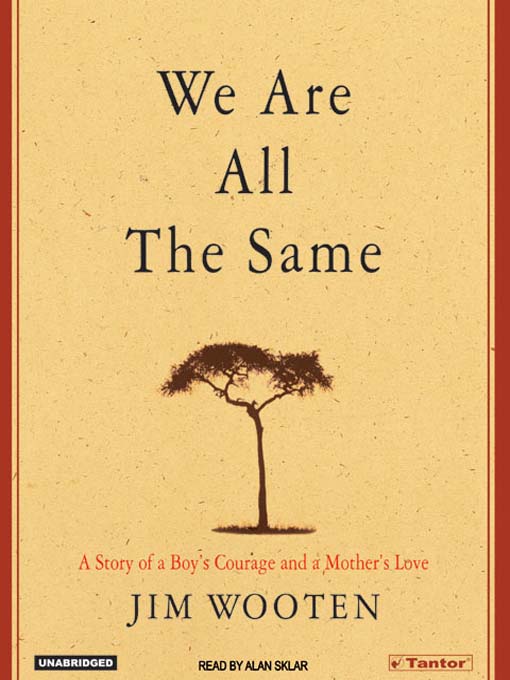
We Are All the Same
A Story of a Boy's Courage and a Mother's Love
- اطلاعات
- نقد و بررسی
- دیدگاه کاربران
نقد و بررسی

We are all the same was the closing line of young AIDS sufferer Nkosi Johnson's message to participants in an AIDS conference in Durban. Born HIV-positive, Nkosi was adopted by Gail Johnson, a white South African woman, after his mother's death from AIDS. His story became a symbol of the AIDS crisis in Africa when Johnson tried to enroll him in a public school. ABC News reporter Jim Wooten followed Nkosi's experiences as he became a celebrity in his own country and worldwide. Wooten makes the story of Nkosi's short life a personal one; his admiration for the boy is clear. Inspiring and touching by turns, the story puts a human face on an emotional issue. J.A.S. 2006 Audie Award Finalist (c) AudioFile 2005, Portland, Maine

Starred review from September 6, 2004
The author, an award-winning senior correspondent for ABC News, has written an extraordinarily moving account of a courageous South African boy's battle with AIDS that is also a scathing indictment of South African leaders who have failed to confront the AIDS epidemic in their country. Nkosi, born in 1989 in the former Zululand, was infected by his poverty-stricken mother, Daphne. As Wooten recounts, Daphne moved heaven and earth to insure that her son would be provided for after her own death and agreed to his adoption, at age three, by Gail Johnson, a white South African, who had met Nkosi at a hospice. A hero in her own right, Johnson nourished Nkosi's strong spirit, which gave out only when he died at the age of 12. Before then, Johnson and Nkosi traveled internationally to gain support for Nkosi's Haven, a home for women and children with AIDS in South Africa. Looking at the larger picture, Wooten points out that Nelson Mandela refused to deal with the AIDS crisis because he was embarrassed to speak publicly about sex (a position he later said he regretted). Mandela's successor, Thabo Mkebi, has also hampered attempts to get antiretroviral drugs to AIDS victims, absurdly denying that the virus HIV exists. According to Wooten, 20% of South African girls are currently infected with HIV and 7,000 infants die of AIDS each month. This powerful account puts a human face on a catastrophic epidemic that grows worse daily. (On sale Nov. 4)
Forecast:
Nkosi's fame was such that his obituary appeared on the front page of the
New York Times. A tie-in to World AIDS Day promotion should help garner sales for this title.




دیدگاه کاربران